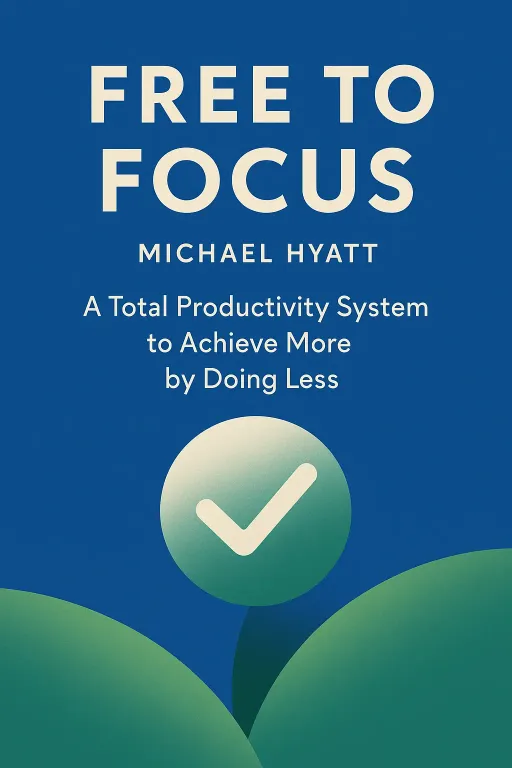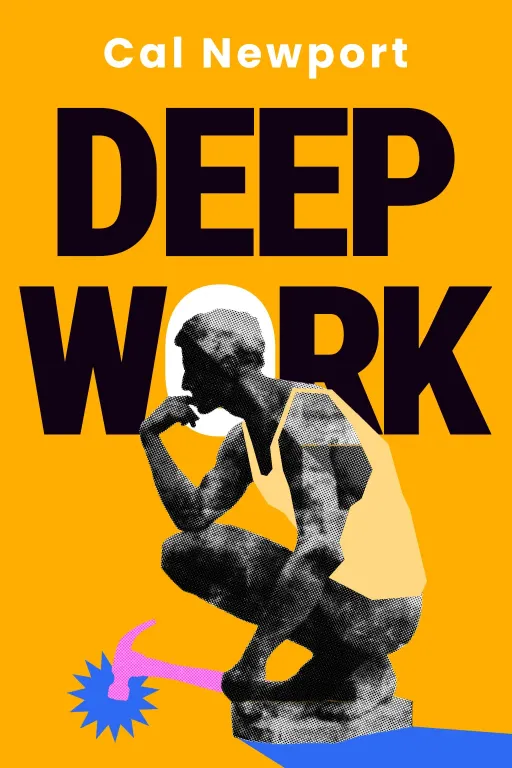
Free to Focus
10 minA Total Productivity System to Achieve More by Doing Less
Introduction
Narrator: During a business dinner in Manhattan, publishing executive Michael Hyatt felt a sharp, intense pain radiate through his chest. Convinced he was having a heart attack, his colleague rushed him to the nearest hospital. After a battery of tests, the doctors found nothing wrong with his heart. This terrifying experience repeated itself twice more over the next year, each time with the same result: no heart attack. Finally, a cardiologist in Nashville delivered the real diagnosis. It wasn't his heart; it was severe acid reflux brought on by overwhelming stress. The doctor's warning was stark: if Hyatt didn't change his relationship with work, the next time the chest pain came, it could be the real thing. This health scare became the catalyst for a complete re-evaluation of his life and work, forcing him to confront a critical question: What if the modern obsession with productivity is not only failing us but actively harming us? In his book, Free to Focus, Michael Hyatt presents the system he developed to escape this trap, a framework designed to achieve more by intentionally doing less.
The Hidden Cost of the Distraction Economy
Key Insight 1
Narrator: The modern professional world operates within what Hyatt terms the "Distraction Economy." It's an environment defined by a relentless flood of information, constant interruptions, and the pervasive expectation of immediate availability. The numbers paint a grim picture: office workers lose up to six hours per day to distractions, and the U.S. economy takes a hit of nearly $1 trillion annually from this lost productivity. The problem is epitomized by email, with over two hundred million messages sent every minute and professionals spending more than six hours a day just managing their inboxes.
This constant barrage creates what Nobel laureate Herbert Simon called a "poverty of attention." When information is abundant, the truly scarce resource becomes human focus. Many people respond to this pressure by adopting what Hyatt calls the "Red Queen" strategy, from a character in Through the Looking-Glass who has to run as fast as she can just to stay in the same place. They try to work harder, faster, and longer, believing that more effort will lead to more output. However, this approach only leads to burnout, stress, and, as Hyatt personally discovered, severe health consequences. The core problem isn't a lack of effort; it's a misapplication of focus. The Distraction Economy thrives by pulling attention away from meaningful, high-leverage work and toward urgent but unimportant noise. Escaping this cycle requires a fundamental shift away from simply doing more and toward a system that deliberately protects and directs one's focus.
Stop Before You Start with Formulation and Evaluation
Key Insight 2
Narrator: The first step in the Free to Focus system is counterintuitive: Stop. This doesn't mean ceasing all activity, but rather pausing to gain clarity before taking action. This step involves three crucial practices, beginning with Formulation and Evaluation. Formulation challenges the conventional goals of productivity. Instead of aiming for mere efficiency or success, Hyatt argues the true goal should be freedom—the freedom to be present with family, to be spontaneous, to pursue passions, and even the freedom to do nothing at all. This requires individuals to define what their ideal life and work balance actually looks like.
Once that vision is formulated, the next phase is to Evaluate current tasks and commitments. To do this, Hyatt introduces the "Freedom Compass," a tool that assesses activities on two axes: passion and proficiency. This creates four distinct zones. The "Drudgery Zone" contains tasks you dislike and aren't good at. The "Disinterest Zone" includes tasks you are proficient in but have no passion for. The "Distraction Zone" is for tasks you enjoy but aren't skilled at. Finally, the "Desire Zone" holds the activities you are both passionate about and highly proficient in. This is where the highest-value work happens. The goal of the entire system is to systematically eliminate, automate, or delegate tasks from the other three zones to maximize the time spent in the Desire Zone, where work feels effortless and produces the greatest results.
Cut the Clutter Through Elimination and Delegation
Key Insight 3
Narrator: The second step, Cut, is about ruthlessly pruning non-essential commitments. Hyatt emphasizes a critical truth: time is a zero-sum game. There are only 168 hours in a week, and as he states, "every yes inherently contains a no." Saying yes to a breakfast meeting is saying no to a morning workout. Saying yes to a late client dinner is saying no to family time. True productivity requires acknowledging these trade-offs and becoming skilled at saying no.
This means creating a "Not-to-Do List" and learning to decline requests that fall outside the Desire Zone. For many, this is the hardest part. To make it easier, Hyatt shares a strategy for delivering a "positive no." For instance, when he was constantly asked to review book proposals—a time-consuming task—he developed a template. The response followed a "yes-no-yes" structure: it affirmed the person and their hard work (the first "yes"), clearly stated he couldn't review the proposal (the "no"), and then offered helpful alternative resources (the final "yes"). This approach protects one's time while preserving the relationship. Cutting also involves negotiating out of existing commitments that are a poor fit. By taking responsibility and offering to help find a better solution, it's possible to exit gracefully. Beyond elimination, this step also involves automating repetitive tasks and delegating work that others can do, freeing up even more capacity for high-impact activities.
Act with Intention by Designing Your Week and Day
Key Insight 4
Narrator: The final step, Act, is where the system is put into daily practice. It begins with Consolidating time by designing an "Ideal Week." This involves blocking out time for three types of activities: "Front Stage" (high-energy, public-facing work), "Back Stage" (preparation and planning), and "Off Stage" (rejuvenation and rest). This structure minimizes context-switching and creates dedicated time for deep work.
Next comes Designating priorities. Instead of a long, overwhelming to-do list, Hyatt advocates for identifying the "Weekly Big 3"—the three most important things to accomplish that week to move major goals forward. This weekly focus is then broken down into a "Daily Big 3." This simple constraint forces prioritization and creates a clear path to victory each day. The impact of this can be profound. One professional named Stephen used to work twelve-hour days, constantly stressed and feeling like he was failing. After implementing the Daily Big 3, he focused only on his most critical tasks. The result was astonishing: he began working half as much, was home by 4 p.m. to be with his daughters, and his business actually grew. Finally, Activating this plan means fiercely protecting your focus from interruptions and distractions. This involves setting communication boundaries, using technology to block distracting sites, and building the mental resilience to stay on task.
Conclusion
Narrator: The single most important takeaway from Free to Focus is that productivity is not about managing time; it's about managing attention. The system's power lies in its recognition that in a world overflowing with information, the ability to direct one's focus is the ultimate competitive advantage. It’s a shift from a reactive, frantic state of "doing" to a proactive, intentional state of "achieving."
The book challenges us to stop seeing an empty calendar as a void to be filled and instead see it as an opportunity for the deep work that truly matters. The most profound question it leaves us with is not how to get more done, but what we would do if we finally had the freedom to focus. If you could reclaim hours from your week, what single project, relationship, or passion would you pour that newfound attention into? The answer to that question is where real productivity begins.









